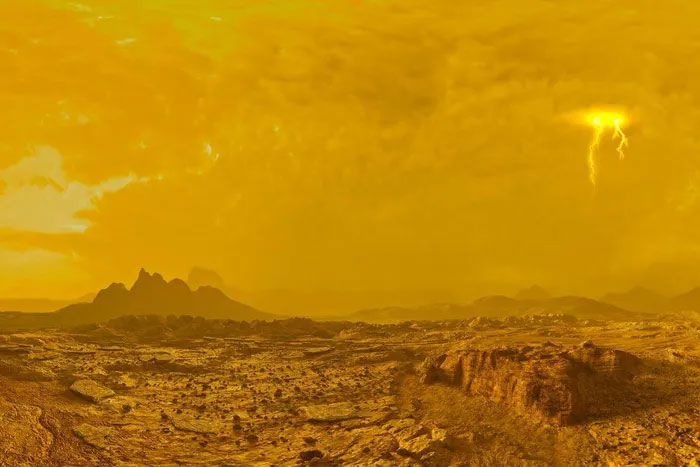Hell on Venus is a valuable lesson for people on Earth
Do you really understand the future of Earth? Our planetary neighbor gives us a glimpse of what could happen to Earth if climate change goes unchecked.
Scientists from the University of Colorado Boulder recently discovered that Earth's neighboring planet Venus has no water. Venus lost water due to a combination of processes that occurred billions of years ago. Initially, during its formation, Venus could have received the same amount of water as Earth from comets and asteroids from the outer Solar System. However, over time, catastrophic events occurred that caused Venus to lose all its water, becoming a hell with life.

The surface of Venus is the most terrifying place among the rocky planets in the Solar System.
The story of water on Venus
Planetary scientists have used computer simulations to trace the 'story of water on Venus'. A major factor in Venus's dehydration was the development of a severe greenhouse effect caused by a thick layer of carbon dioxide in the planet's atmosphere . This layer retains heat, raising the surface temperature to significantly higher levels.
The greenhouse effect on Venus is the strongest in the Solar System and causes the surface temperature to skyrocket to about 500 degrees Celsius. As a result, water on Venus evaporates, flying into space without stopping. This makes the environment on Venus hot and uninhabitable due to dehydration.
Eryn Cangi, a research scientist at the Laboratory for Atmospheric and Space Physics (LASP) and co-author of the new study, said: 'Water is really important for life. We need to understand the conditions that support liquid water in space and that could account for the very dry state of Venus today.'
Dehydration twice as fast
Despite the initial loss of water due to the greenhouse effect, Venus then continued to lose water into space at nearly twice the rate previously thought. Research shows that hydrogen atoms in Venus's atmosphere escaped into space through a process called 'dissociative recombination' , aided by molecules such as HCO+. This constant loss of water contributes to Venus's current dry state.
(Dissociative recombination is a chemical process in which a positive polyatomic ion combines with a free electron and results in a dissociated neutral molecule). This reaction is important for chemical processes in interstellar or interplanetary space. On Earth, dissociative recombination rarely occurs naturally, as free electrons react with any molecules (including neutral molecules) they encounter. Even under the best laboratory conditions, recombination and dissociation are difficult to observe. Yet, it is an important reaction in environments with large numbers of ionized molecules such as plasma at atmospheric pressure.
In astrophysics, dissociative recombination is one of the main mechanisms by which molecules break down and other molecules are formed. The existence of dissociative recombination is possible due to the vacuum of the interstellar medium.
Cangi asserts that Venus is definitely dry with the comparison: 'If you took all the water on Earth and spread it across the planet like jam on toast, you would have a layer of liquid about 3km deep. If Venus underwent a similar process from water trapped in its atmosphere, the planet would have only 3 centimeters of water left, not even enough to wet a person's toes."
'Venus has 100,000 times less water than Earth, even though it is essentially the same size and mass,' said Michael Chaffin, co-lead author of the study and a scientist at LASP.
The scientist also said that the new findings reveal hints about why Venus looks so different today even though in ancient times it may have looked exactly like Earth.
Cangi added: 'We are trying to understand what small changes happened on each planet to put them in very different states.'
The sun and orbit are the key issues
During their early formation, both Earth and Venus probably received about the same amount of water from comets. Venus may also have an ocean like Earth and is ready to be a nursery for life. But over time, the Sun becomes more active and Venus's orbit is about 50 million km closer to the sun than Earth. That makes Venus hotter, more water evaporates, and leads to the current hellish situation.
In the distant future, the Sun is predicted to become more active and Earth is at risk of following in the footsteps of Venus. That forces humans to find a way to leave Earth before our planet becomes the second Venus or to find a way to push Earth's orbit further to avoid heat.
The only thing is, the day when the Sun becomes strongly active is still very far away while humans emitting greenhouse gases that warm the Earth is right before our eyes and has dangerous impacts much faster.
- Video: Unusual midnight in hell Venus
- The deadly truth on the 'twin' planet orbiting Earth
- Overview of Venus
- Visit hell 'frightened' of ancient people
- Earth's twin planet has 'died' of suffocation?
- Interesting things about the planet
- Venus is not the Venus, but ... hell
- NASA wants to bring people to Venus
- Polar regions are cooler than anywhere on Earth
- NASA simulates spacecraft falling into 'hell' of Venus
- The ocean may exist on Venus on Earth about 700 million years ago
- Venus is more like the earth than people think
 Van Allen's belt and evidence that the Apollo 11 mission to the Moon was myth
Van Allen's belt and evidence that the Apollo 11 mission to the Moon was myth The levels of civilization in the universe (Kardashev scale)
The levels of civilization in the universe (Kardashev scale) Today Mars, the sun and the Earth are aligned
Today Mars, the sun and the Earth are aligned The Amazon owner announced a secret plan to build a space base for thousands of people
The Amazon owner announced a secret plan to build a space base for thousands of people